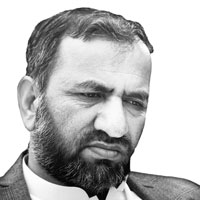Rumors surfaced Wednesday morning that Mullah Omar, the notorious one-eyed leader of the Taliban, had died. The BBC first reported news of Omar’s death, citing “top sources within the Afghan administration and intelligence agency.” The Taliban has reportedly both denied the claim and said it was investigating.
Abdul Hassib Seddiqi, the spokesman for Afghanistan’s National Directorate of Security, said Mullah Omar died in a hospital in the Pakistani city of Karachi in April 2013.
“We confirm officially that he is dead,” he told The Associated Press.
But this is hardly the first time Omar has been said to have died, and security experts urged caution with this latest report. The anonymous rumors Wednesday said Omar might have died as long as three years ago, possibly following a bout of tuberculosis.
“I find that very hard to believe as this would be something that is very difficult to keep secret during all that time,” Thomas Joscelyn, a terrorism expert and editor of the Long War Journal, told The Daily Beast.
Joscelyn noted that the Taliban have routinely released statements attributed to Omar each year, including just recently. “I doubt the Taliban has been pretending that he has been alive,” Joscelyn said. “There are too many people who would have to keep quiet.”
A State Department official told The Daily Beast that officials had “seen the reports and are looking into their viability.”
Omar was said to have been killed in 2011 in Pakistan, a claim that the Taliban swiftly dismissed at the time.
And in November 2014, yet another report said Omar was dead, this time amid reports about infighting within the Taliban’s ranks for control of the group.
U.S. officials have never confirmed any of the reports and have consistently urged caution whenever news of Omar’s potential demise resurfaces.
Sources in the Afghanistan and Pakistan region separately told The Daily Beast that they had no reason to believe Omar has ever left his holdout in Pakistan. In 2011, Pakistani intelligence officials reportedly tried to persuade journalists that they had killed Omar there, potentially as a show of good faith to the United States that the country was cracking down on the militant group.
The U.S. issued a $10 million bounty for Mullah Omar’s capture. Born in Kandahar in 1960 and head of the Taliban for 13 years, a biography published by the Taliban described him as a “charismatic personality.”
His death would mark, at the minimum, a serious setback for the Taliban as it is entering peace talks with the Afghan government and confronted by a rising threat from the self-proclaimed Islamic State. Omar has been a rallying force for many Taliban fighters and his death would almost certainly lead to splits as ISiS seeks to move into parts of Afghanistan.
In the last purported message from Mullah Omar, released this month to mark the end of the Muslim holy month of Ramadan, Mullah Omar endorsed the Afghan peace talks as religiously “legitimate.”
But the message was in the form of a document, not an audio or video message, raising growing suspicions that the elusive leader was dead.
Update 7/29/15 11:33 AM: This story has been updated with an official statement from the Afghan government.








